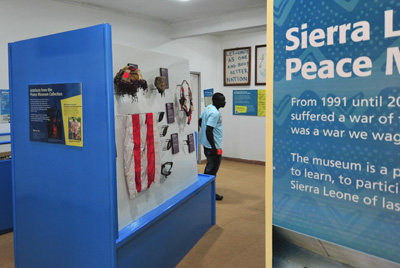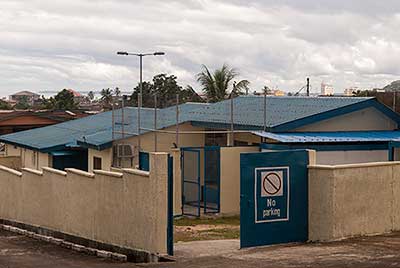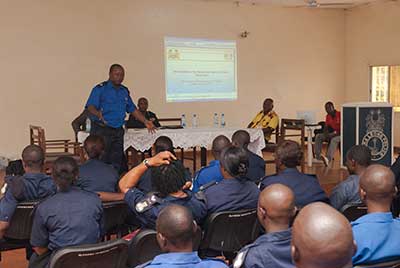For international justice, the Special Court’s Legacy will be the its jurisprudence; for international tribunals it may be its innovative Outreach programme or its unique experience in being the first hybrid ad hoc court, as well as the first court since Nuremberg to achieve its mandate and to close. For the people of Sierra Leone, the Court’s Legacy will be weighed as to its contribution to justice and reconciliation, the re-establishing of the rule of law following a decade of conflict, and the fight against impunity for serious crimes.
In November 2012 and February 2013, the ICTJ hosted Legacy Conferences for the Special Court in New York and Freetown. In January 2013, No Peace Without Justice (NPWJ) and their civil society partners in Sierra Leone and Liberia formally launched their independent survey of the Special Court’s impact and legacy in those two countries at a ceremony in Freetown. These were important milestones in the process of ensuring the Court’s Legacy – a process which began very early in the Court’s existence.
Bearing the Greatest Responsibility: Select Jurisprudence of the Special Court for Sierra Leone
‘Bearing the Greatest Responsibility: Select Jurisprudence of the Special Court for Sierra Leone’, was published by the Judges of the RSCSL on 2 October 2019, and consolidates the unique jurisprudence of the SCSL in a single volume.
It contains hyperlinks to the original indictments and the final trial and appeal judgments of the nine men convicted in four cases tried before the Special Court: The Prosecutor v. Charles Chankay Taylor, as well as the RUF case, the AFRC case, and the CDF case.
The Volume contains a verbatim compilation of the judgments organized according to subject matter: broken down by crime, case, facts, location, and legal analysis; a ‘roadmap’ to the section of the RUF judgments where the crime of offenses to UN personnel was first considered under International Criminal Law; an overview of evidentiary principles applied by the Court to International Criminal Law; and a bibliography of authorities relied on in each of the judgments, organized by source category.
Peace Museum
 The Sierra Leone Peace Museum, which occupies the Special Court’s remodeled former security building, is a Legacy project of the Court and the Government of Sierra Leone. The Peace Museum honors the victims of the war, preserves the history of the war and the story of the peace process, and promotes a culture of human rights.
The Sierra Leone Peace Museum, which occupies the Special Court’s remodeled former security building, is a Legacy project of the Court and the Government of Sierra Leone. The Peace Museum honors the victims of the war, preserves the history of the war and the story of the peace process, and promotes a culture of human rights.
The Museum hosts a full copy of the Special Court’s public archives, as well as the archives of Sierra Leone’s Truth and Reconciliation Commission (TRC) and other important historic documents for the use of researchers and scholars. This pilot exhibition room was created during the lifespan of the Special Court for Sierra Leone. For additional information go to the Peace Museum menu bar.
Witness Protection Programme
 Building on its experience in operating a highly-successful witness protection programme, the Special Court worked with Sierra Leone’s national authorities to establish a witness protection unit that would support the country’s national judiciary.
Building on its experience in operating a highly-successful witness protection programme, the Special Court worked with Sierra Leone’s national authorities to establish a witness protection unit that would support the country’s national judiciary.
The new unit, situated within the Sierra Leone Police, is envisioned as a way to support the prosecution of serious offences such as organized crime, drug smuggling, human trafficking, corruption, and gender-based violence in the national system. It would also assist the Residual Special Court for Sierra Leone in carrying out its ongoing legal obligation to ensure the safety of witnesses who testified in Special Court trials.
The Special Court has provided an office (pictured) and office equipment, and training of police officers, but is still seeking operational funding for the first five years of operations, until the Government of Sierra Leone would be able to take full financial responsibility.
Archives Development Programme
The Court’s records are of permanent value to victims, civil society, activists, academics, lawyers, journalists and future generations in Sierra Leone. While the original archives are stored in The Hague, the Court has established an archive in Sierra Leone that will hold a copy of the Court’s public records. These holdings will be combined with the records of the Truth and Reconciliation Commission and National Commission for Disarmament, Demobilisation and Reintegration to create a unified research center on transitional justice following Sierra Leone’s civil war. Sierra Leone currently lacks an institution with the equipment or systems in place to adequately maintain a permanent archive. The Peace Museum provides a temporary solution able to accommodate a small number of users, yet a dedicated archive facility would greatly improve access and the management and preservation of records. SCSL did put on a number of Archival Training for the staff of National Archives and other Institutions in archive management. Additional resources are required to create a purpose-built facility that would preserve a public copy of the Court’s archives for future generations.
Improving Detention Standards and Access to Justice for Women and Juveniles
On 16 November 2009, the Court’s detention facility was transferred to the Sierra Leone Prison Service, who intends to use the site as a prison for women and juvenile detainees. At the present, there is little capacity in the prisons system to deal with the unique needs of women and juveniles. This project aims to use the expertise at the Special Court to assist the Prison Service in refitting the prison and training its staff to improve the quality of care provided at the new facility. The training will be offered to prison officers nationwide and will focus on international standards of detention for women and juveniles. A second component to the project will train lawyers providing pro-bono services to women and juveniles to improve their understanding of the needs of these vulnerable groups and strengthen their advocacy skills. Funding is required for the equipment and modifications needed in the detention facility and to train prison service staff and lawyers in relevant aspects of gender and juvenile justice.
Capacity-Building: Professional Development Programme
The Court employs leading experts in various justice sector fields from across the world. Training courses have been organized to transfer these skills to the national judicial system. Training topics include records management, interpretation, administration of juvenile cases, and control and restraint training for prison guards, amongst others. The European Commission has provided 55,000 USD for training courses on records and information management with the staff of national archival institutions and court interpretation. Funding is required for courses including, but not limited to, training for lay magistrates, training for the Sierra Leone Police, domesticating international criminal law including gender-based crimes.
Accountability Now Clubs
Beginning in 2003 the Special Court, through Outreach, engaged with university students at tertiary institutions across Sierra Leone and later in Liberia, supporting them in the formation of Accountability Now Clubs (ANC). The ANCs served to involve university students in justice and accountability issues. In the near term, the ANCs supported the work of the Outreach Section on university campuses and the surrounding communities, but the ANCs were also meant to be permanent and to outlast the Special Court. Outreach provided training for members in human rights, the Special Court, project writing and implementation, avoiding mismanagement in organisations, communicating with groups, and financial management. As the Court neared completion of its mandate, Outreach worked with various ANC chapters to institutionalise them and to assist them in applying their experience to institutions in the national system. In 2010, ANC members who graduated from various universities created a coalition which now operates as an independent organisation working on issues relating to human rights and the rule of law.
Sierra Leone Legal Information Institute (OTP Legacy Project)
Better known as Sierra Lii, the Sierra Leone Legal Information Institute was begun in February 2009 to provide free online access to Sierra Leone’s primary legal materials and related information. The Office of the Prosecutor brought together primary stakeholders including Parliament, the Judiciary, the Attorney-General’s office, the Sierra Leone Bar Association, Fourah Bay College, the Law Reform Commission and Civil Society to create an entity to host Sierra Lii for the long term and to develop a long-term management sustainability plan.
Training of Police Prosecutors (OTP Legacy Project)
 In 2009 and 2013 the Office of the Prosecutor trained police prosecutors in all three of Sierra Leone’s provinces and in the Western Area, which includes the capital Freetown. Criminal prosecutions in Sierra Leone’s Magistrates Courts are normally conducted by police officers, not lawyers, and so the trainings were designed to introduce participants to the basics of prosecutorial skills, summary trials, preliminary investigations, the conducting of proper investigations, strategy and ethics, witness and victims management, case management, police liaison with the Prosecutions Department, analysis of the rules as to information and indictment and basic advocacy skills . The trainings typically targeted police officers who were new to police prosecutions, since longer-serving police prosecutors and often learnt the proper procedures through experience.
In 2009 and 2013 the Office of the Prosecutor trained police prosecutors in all three of Sierra Leone’s provinces and in the Western Area, which includes the capital Freetown. Criminal prosecutions in Sierra Leone’s Magistrates Courts are normally conducted by police officers, not lawyers, and so the trainings were designed to introduce participants to the basics of prosecutorial skills, summary trials, preliminary investigations, the conducting of proper investigations, strategy and ethics, witness and victims management, case management, police liaison with the Prosecutions Department, analysis of the rules as to information and indictment and basic advocacy skills . The trainings typically targeted police officers who were new to police prosecutions, since longer-serving police prosecutors and often learnt the proper procedures through experience.
International Prosecutors’ Best Practice Project (OTP Legacy Project)
In collaboration with the Offices of the Prosecutor of the International Tribunal for the former Yugoslavia (ICTY), the International Tribunal for Rwanda (ICTR), the Extraordinary Chambers in the Courts of Cambodia (EEEC), and the Special Tribunal for Lebanon (STL), the Office of the Prosecutor has worked to document the recommended practices from each Office. The project consulted widely with current and past members of the various OTPs, including current and former Prosecutors, and resulted in a best practices manual to assist investigators and prosecutors at the international level, as well as relevant national prosecuting authorities.

